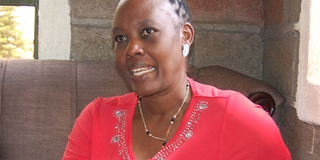Injection leaves Cecilia Kimani with permanent disability

Cecilia Githigu Kimani who suffered a sciatic nerve injection injury at the age of six that left her leg with a permanent disability. PHOTO | FRANCIS MUREITHI | NATION MEDIA GROUP
What you need to know:
In 1979, Ms Kimani, who had a stubborn cough, was taken to a public dispensary in Kiambu by her mother.
Dr Koech observed that Ms Kimani’s sciatic nerve injury may have occurred following intramuscular injection.
Ms Kimani got irritated whenever villagers used her disability whenever they were searching her parents or their home.
When people see Ms Cecilia Githigu Kimani limp as she supports her right leg with her hand, they assume that she was attacked by polio in childhood.
But Ms Kimani suffered a sciatic nerve injection injury at the age of six that left her leg with a permanent disability. Her parents could not immediately recognise nerve injection injury.
DEPRESSION
For nearly three decades, Ms Kimani, a former Unit manager at Britam Insurance company in Nakuru town, exhibited signs of depression and never revealed to anyone how one of her legs was crippled.
In 1979, Ms Kimani, who had a stubborn cough, was taken to a public dispensary in Kiambu by her mother.
The clinical officer on duty scribbled something on a piece of paper before telling her to lie down.
“As soon as I was injected, I could not stand up again. I felt too weak to walk. The clinical officer assured my mother that everything would be okay as soon as we reached home,” recounts Ms Kimani, 44.
She added: “On reaching home, I could neither stand nor walk. My mother tried to force me to stand but every time I tried, I collapsed. Something had gone terribly wrong with my right leg.”
WEAKNESS
“Interestingly, my mother could not connect the weakness to the injection I had at the dispensary and that complicated the matter,” she said.
The following day, her father took her to Kenyatta National Hospital by her father where doctors confirmed that her sciatic nerve had been injured.
“My father was shocked and almost collapsed in the examination room when the doctor revealed that the condition was irreversible and that my leg would never be the same again,” said the mother of one.
According to Dr Florentius Koech, a neurosurgeon at the Moi Teaching and Referral Hospital, the sciatic nerve is the longest and widest nerve in the human body.
"It runs from the lower back, through the buttocks, and down the legs, ending just below the knee,” said Dr Koech.
“This nerve controls several muscles in the lower legs and supplies sensation to the skin of the foot and the lower leg,” he said.
Dr Koech observed that Ms Kimani’s sciatic nerve injury may have occurred following intramuscular injection.
GLUTEAL INJECTIONS
The spine specialist said when giving gluteal injections, it is safest to use the upper outer quadrant. He added that injuries to the sciatic nerve is associated with use of dorsogluteal (upper outer quadrant of the buttocks) site injection.
“The choice of site for injection must be based on good clinical judgement because any slight mistake may lead to a permanent injury to the patient.”
“It is paramount for the injection to be conducted by a qualified medic,” he added.
At the same time, the spine specialist told Healthy Nation that sciatic injury could also occur if the nerves are injected with wrong chemicals.
“For an injury of the sciatic nerve via wrong chemical, this could easily be corrected if the patient seeks treatment immediately as there are some antibiotics which could repair the nerves,” said Dr Koech
DEATH
Ms Kimani says her parents tried in vain to raise a complaint on the conduct of the clinical officer but nobody at the dispensary was willing to help them.
“There was no one to advise my parents on how to raise the matter with relevant bodies,” said Ms Kimani.
“My father never recorded a statement with any relevant medical body, so the matter died a natural death and I decided to move on,” she said.
The revelation saw her dreams of joining a nursery school near her home end in tears.
“My father enrolled me at Thika-based Joy Town School for the disabled,” she said, adding that while in Class Three, her condition worsened and she was taken to The Mater Hospital in Nairobi where she was hospitalised for several days.
She says the disability saw her separate with her parents at an early stage.
BOARDING SCHOOL
“I went to a boarding school when I was only seven years old. I didn’t know I could be separated with my parents at such a tender age,” she said.
“I missed parental love. It was very painful and I felt inferior and I avoided any social interactions. Anytime visitors would come to our home, I would hide in the bedroom, I almost committed suicide,” Ms Kimani said.
“For many years I kept asking God why me…I didn’t want anybody near me including my sisters. The only place I found comfort was at Joy Town Primary School for the handicapped because everybody was disabled,” she recalls.
IRRITATED
She said she got irritated whenever villagers used her disability whenever they were searching her parents or their home.
“It was annoying to have villagers referring me through my physical disability,” she said Ms Kimani who proceeded to Joy Town Secondary School and later joined Egerton University where she pursued a degree in Agricultural Education and Extension.
She says her most trying moments at the university was moving from lecture halls that were far apart.
“I skipped many classes as my movement was restricted as the callipers kept on breaking and injuring my leg,” she said.



